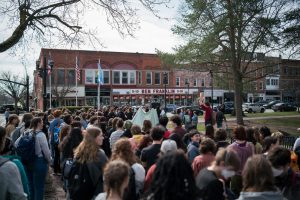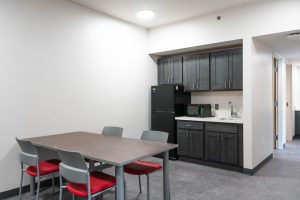Karega Governance Process Enters Seventh Month
September 2, 2016
As Professor of Rhetoric and Composition Joy Karega’s governance process enters its seventh month, many members of the Oberlin community are asking: What’s taking so long?
The disciplinary process began all the way back in March when the Board of Trustees requested that the College begin an official governance process and investigate Professor Joy Karega for Facebook posts that many considered anti-Semitic.
“None of us outside of those people on the specific committees have any idea why it’s taken so long and what exactly is going on,” said Chris Howell, Politics department chair.
While faculty governance processes are always confidential, the sheer length of the process — as well as the unique issues raised by the case — led some faculty members to send a petition calling for more transparency to the various governance committees on Aug. 12.
“We insist on knowing when we can expect the Professional Conduct Review Committee to complete its review and share its findings,” the petition reads. “We believe it is imperative that Oberlin is completely transparent with faculty, students, and alumni as to how a ruling is determined in order that all members of our community, especially young faculty, are reassured by a process not based on emotion, but rather on a strict and ethical adherence to policy and practice.”
The petition also questions how the College will fill the gap left by Karega in the Rhetoric and Composition department as someone who “ignited new interest” in the field among students of color and first-generation students.
To Justin Emeka, professor of Africana Studies and Dance, the case will set an important precedent and could limit the independence of the faculty.
“I need some more clarity in terms of the policy moving forward, of how Facebook posts, how people’s personal ideas, are used to evaluate their ability as a professor,” Emeka said. “That’s my concern, which is why I signed the letter.”
The PCRC is a permanent, elected faculty committee that exists solely to deal with faculty-governance cases. When a faculty governance process begins, half of the committee forms an Investigative Panel and the other half forms a Hearing Panel. The Investigative Panel establishes the facts, while the Hearing Panel issues a recommendation.
Howell said that the PCRC’s role in the process probably began at either the end of May or the beginning of June. However, barring “extraordinary circumstances,” the written governing process suggests that the PCRC process should only take 52 days at an absolute maximum.
After the PCRC issues its recommendation, the case should go to General Faculty Council, which in turn issues its own recommendation to President Krislov.
Krislov can accept the GFC recommendation, reduce the penalty recommended by the GFC or reject the recommendation altogether. If he recommends suspension or dismissal, the Board of Trustees then makes the final decision.
However, according to Howell, previous cases that involved dismissing tenured or tenure-track faculty have also involved the College Faculty Council.
“There’s a longstanding assumption that if termination of employment for a tenured or tenure-track faculty is at stake, [the] CFC needs to be involved because CFC hires and promotes — and therefore ultimately doesn’t promote — everyone who is tenure-track,” Howell said.
It’s not clear that the Karega process is following that precedent.
The Review attempted to get in contact with every faculty member of the General Faculty Council and the College Faculty Council, but most declined to be interviewed or failed to respond.
However, Sociology Professor and College Faculty Council member Greggor Mattson wrote in an email, “I don’t have any information about the process.”
Further complicating matters, all three faculty committees that may be involved changed membership on July 1. In some of the committees, only a couple of members remained from last year. It’s unclear if the membership change delayed the process.
As a tenure-track professor in her third year, Professor Karega’s contract will also be under review later in the academic year, but like so many other aspects of the case, the potential impact of the governing process on her review is currently uncertain.
The Review sent President Krislov a series of questions about the process; he declined to answer them, citing confidentiality.
“Toward the goal of ensuring the process is as reasonable as possible, the procedures governing the process reflect substantial procedural safeguards for all parties involved, including and especially Professor Karega,” Krislov wrote in an email to the Review.

























